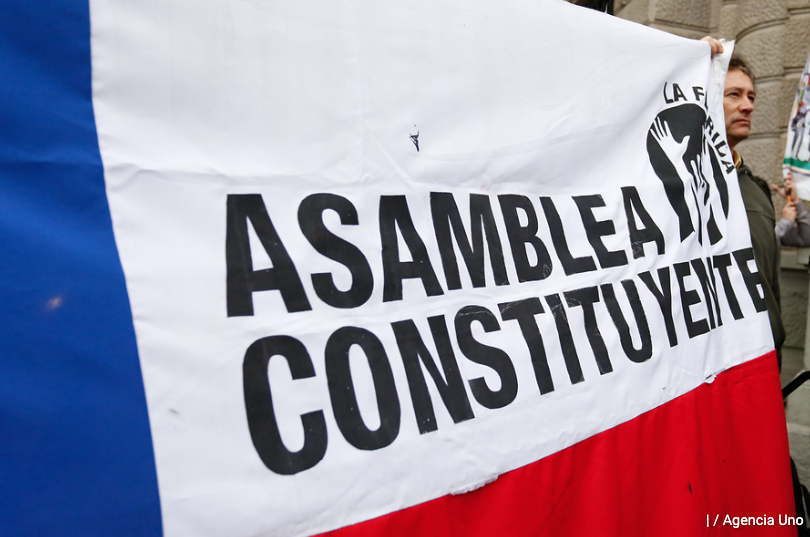The draft constitution presented by the assembly members of the Chilean Constituent Convention contains the design of an affective political control regime. Although at the moment it is only a collection of articles without proper legislative structure, with many redundancies and contradictions, it is worth reading as it represents the culmination of the “woke” left or “woke” doctrine. Although the constituent has good intentions and wants to correct previous injustices and those to come, the text reveals the eagerness to suppress the bases of liberal democracy in which human beings are equal before the law and replace the equality of citizens with fragmented identities and “affective” orientations.
This affective political regime has subjectivity as its paradigm. The rights, according to many of the articles proposed by the Chilean constituents, do not belong to all citizens (although they pretend to), but to all those persons who define themselves or are defined by the State in some way.
Sex-gender dissidents
The most striking case is the one that refers to gender identity. In the chapter on parity democracy, it is stated that “The State recognizes and promotes a society in which women, men, diversities and sex-gender dissidents participate in conditions of substantive equality, recognizing that their effective representation in the democratic process as a whole is a principle and minimum condition for the full and substantive exercise of democracy and citizenship” (1.- Article 2). The idea of sex and gender diversities is understood beyond the duality of man, woman; heterosexual, or homosexual. But it is less obvious what is meant by “sex-gender dissidence”. Dissidence with respect to what or against what?
When the text refers to “substantive equality”, a term that is repeated in the draft, it establishes that “The Constitution ensures substantive gender equality, obliging it to guarantee equal treatment and conditions for women, girls and sex-gender diversities and dissidents before all state bodies and spaces of civil society organization” (105. Article 6).
In this case, it seems that sex-gender dissidence is defined in opposition to masculinity. The text returns to “sex-gender dissidents” in the section on the right to a life free of gender-based violence, emphasizing that it refers to violence against women, girls, and the so-called sexual and gender dissidents. This reaffirms the implicit assumption that “dissidence” is in relation to the male, who would be the perpetrator of gender-based violence, as indeed most cases are.
A first conclusion is that in the draft of the possible future Constitution the very vague category “sex-gender dissidents” has been included to accommodate all possibilities of sexual behavior and gender identification that go beyond those known as male, female, homosexual, heterosexual, bisexual, transgender, pansexual, non-sexual, etc. The very idea of dissidence also implies opposition to other sexual preferences or gender identification, especially male. Dissident would be any person who from their interests, affections, or passions wants to be or do whatever they want, so they cannot suffer any discrimination, according to the Chilean constituent.
To this vague category of sex-gender dissidents, we must add another in which women lose the biological exclusivity of being the only ones who can have another human being in their body and give birth. In the chapter on sexual and reproductive rights, it is written: “The State guarantees the exercise of sexual and reproductive rights without discrimination, with a gender perspective, inclusion and cultural relevance, as well as access to information, education, health, and the services and benefits required for this purpose, ensuring all women and people with the capacity to bear children, the conditions for pregnancy, voluntary interruption of pregnancy, voluntary and protected childbirth and maternity…”. (253.- Article 16). Who are, besides women, persons with gestational capacity? Gestation becomes an asexual process, emptied of its femininity.
Not citizens, but feelings
The constitutional text breaks with the distinction between public action and the individual space of feelings. Let us recall that the expedient of “mental illness” (i.e. affective states) has been used to suppress and imprison dissidents in fascist and communist totalitarianism.
When the draft prescribes the right to identity it is said that “Every person has the right to the free development and full recognition of his identity, in all its dimensions and manifestations, including sexual characteristics, gender identities and expressions, name and sex-affective orientations” (249.- Article 12). What differentiates sex-affective orientations from others? The only thing that seems different is the emphasis placed on the affective, i.e. on feeling as a variable of identification.
In a formulation of the right to personal integrity that has a very laudable objective, such as the prevention of mistreatment and torture, the text proposes that “Everyone has the right to physical, psychosocial, sexual and affective integrity…” (259.- Article 24). How can psychosocial or affective integrity be regulated? What is the role of a State in the normalization of human subjectivity? The answer is, in principle, none. However, in the regime of affective political control, the State has the obligation to protect and mold feelings.
When speaking of the right to equality and non-discrimination, the proposed article has an invasive character of the private sphere of affection: “In Chile, there is no privileged person or group. All forms of slavery are prohibited. The right to protection against all forms of discrimination is assured, especially when it is based on one or more grounds such as nationality or statelessness (sic), age, sex, sexual or affective orientation […] or any other social condition” (291.- Article 23). Affective orientation is not easy to define, since sentimental parameters are highly subjective, variable and sometimes labile. In the case of “any other social condition,” it leaves the door open to capricious interpretations by State bureaucrats.
Adjectivizing equality
Chilean constituents put much emphasis on adjectivizing equality as “substantive” or the “substantive” exercise of democracy. However, equality should not be adjectivized, since it includes all humans without distinction. We are equal, period. As the Universal Declaration of Human Rights proclaims in its first article: “All human beings are born free and equal in dignity and rights and, endowed as they are with reason and conscience, should behave towards one another in a spirit of brotherhood”.
However, in the constitutional draft, the “substantive” aspect of equality does not lie in its universal conception of what is human, but in the disaggregation of the person according to purely subjective definitions. And it is precisely in the regulation of the subjective that the text grants enormous power to the State to implement a policy that decides which emotions are acceptable and which are not.
This draft is symptomatic of a global trend in which a discourse is imposed that fragments the very conception of the human being. This discourse penetrates all institutions and dissolves people into micro-identities that depend on the moods of the powerful ones, vigilant, will persecute and re-educate those who do not fit into the affective molds prescribed by their “true” doctrine.
Translated from Spanish by Janaína Ruviaro da Silva













